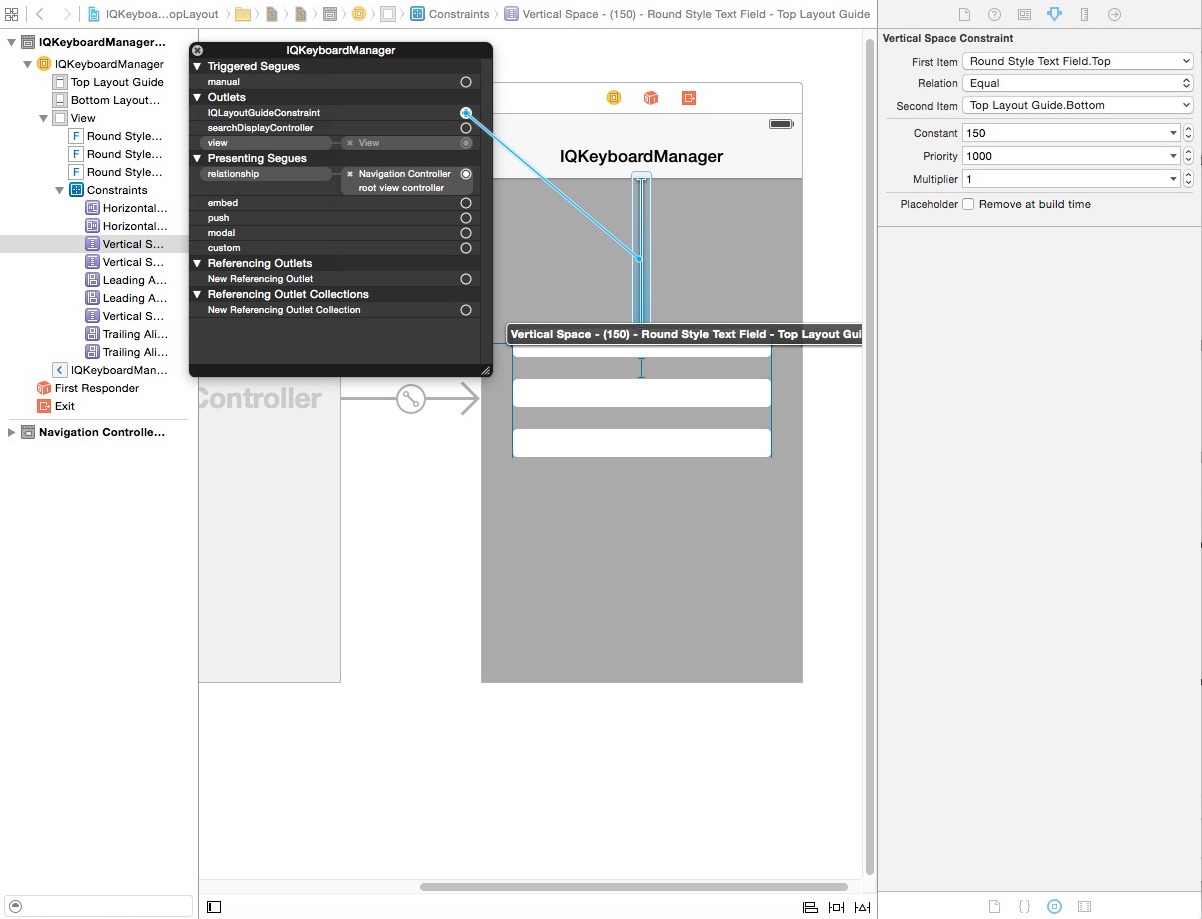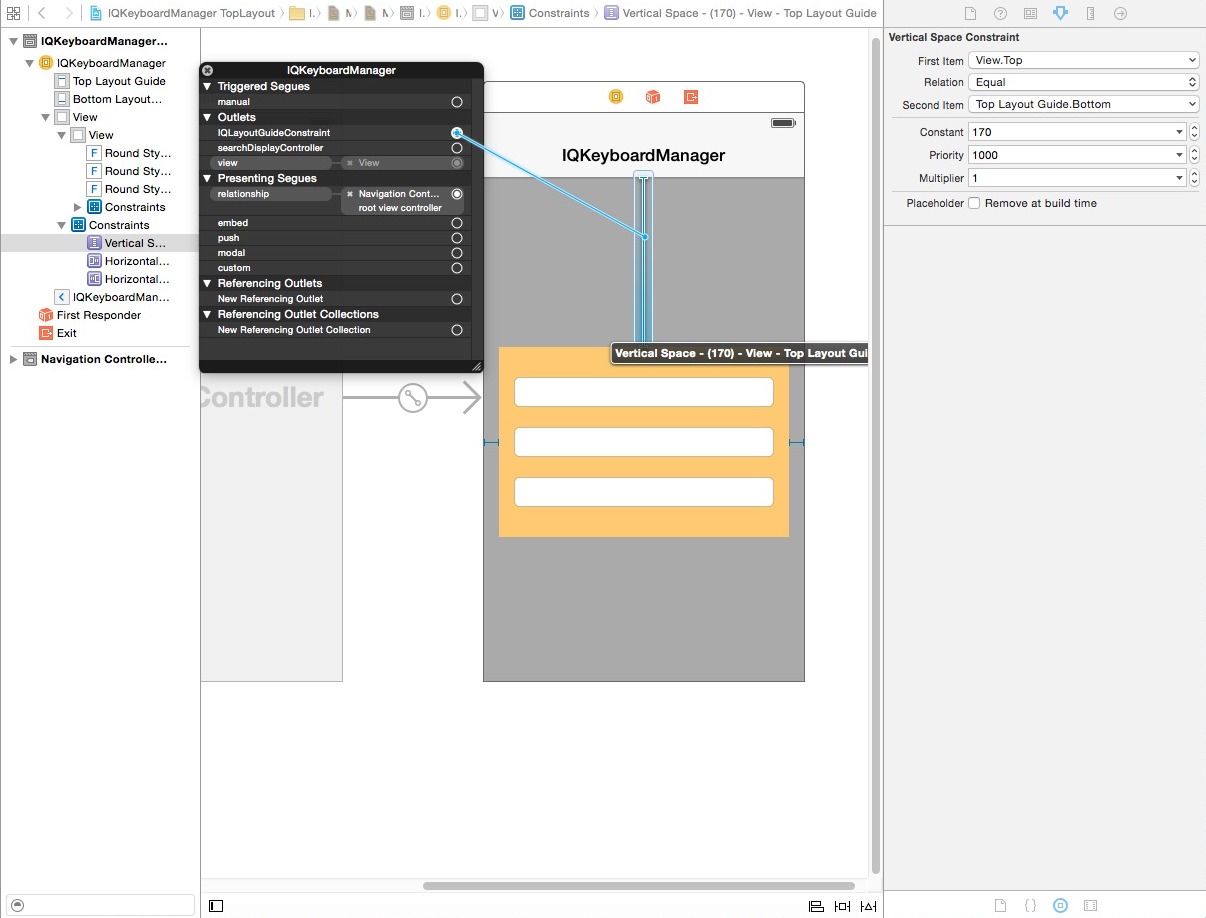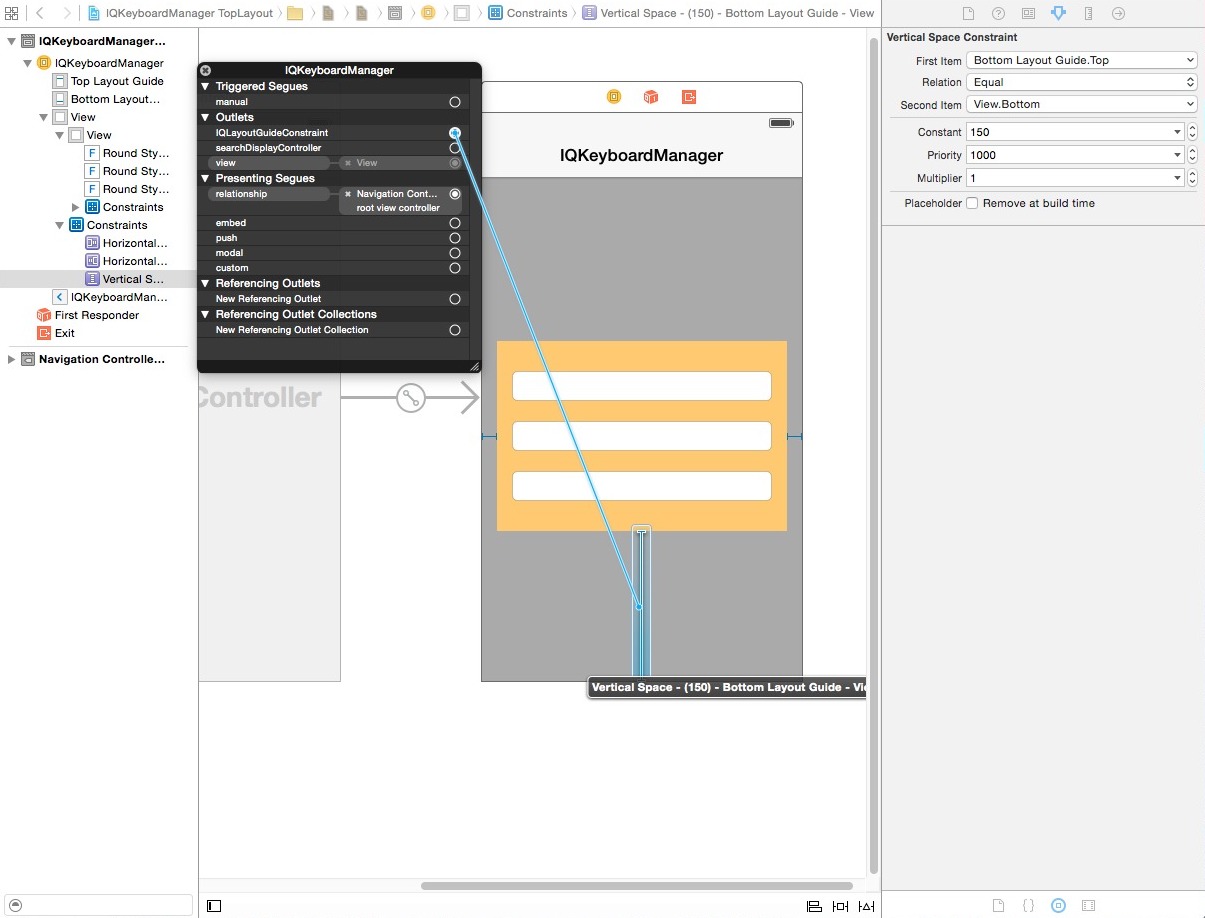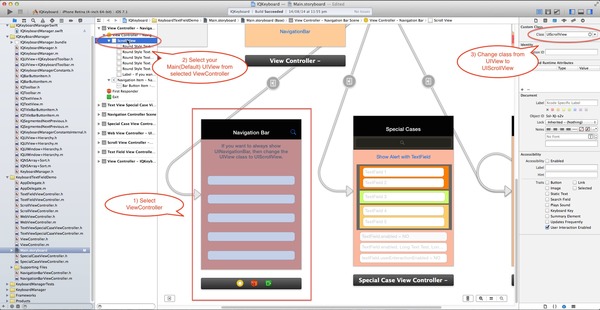If you don't want to hide the default UINavigationBar of UINavigationController when keyboardManager slides up the view, then just change the UIView class to UIScrollView from the storyboard or xib. Make sure that scrollView is able to get it's contentSize from constraints.(#21, #24)
If you are not using storyboard or xib and creating your view programmatically. Then you need to override '-(void)loadView' method of UIViewController, and need to set an UIScrollView instance to self.view.
-(void)loadView
{
UIScrollView *scrollView = [[UIScrollView alloc] initWithFrame:[[UIScreen mainScreen] bounds]];
scrollView.contentSize = CGSizeMake(CONTENT_WIDTH, CONTENT_HEIGHT); //You may not need this code if you are working with Autolayout and scrollView is able to get it's contentSize from constraints.
self.view = scrollView;
}Technically IQKeyboardManager moves upwards/downwards of currently presentedViewController's view. So if you're pinning your UITextfield/UITextView with TopLayoutGuide/BottomLayoutGuide then you're saying Keep x distance from screen top(I don't care about where is self.view)'. In this case your view is moved upwards but textField remains at same position and keeping x distance from screen top.
To fix it, just let IQKeyboardManager know the constraint which is pinned with TopLayoutGuide/BottomLayoutGuide, just map TopLayoutGuide/BottomLayoutGuide constraint with IQLayoutGuideConstraint. Here is the screenshot:-

If your textFields are inside any UIView and your UIView is pinned with TopLayoutGuide/BotomLayoutGuide then also you can map TopLayoutGuide/BottomLayoutGuide constraint with IQLayoutGuideConstraint. here are the screenshots:-


Often we have a situation where a full screen UITextView need to show in full screen mode with keyboard handling. To deal with this kind of situation, here is an easy workaround.
Assuming that UITextView needs to be displayed in full screen within a ViewController View and default UINavigationBar of UINavigationController is displaying at at the top of ViewController. Assuming that Adjust Sroll View Insets checkmark is ticked. Add these constraint to UITextView:-
- Top Space to SuperView
- Leading Space to SuperView
- Trailing Space to SuperView
- Bottom Space to Bottom Layout Guide (Important)
Connect bottom layout guide constraint with IQLayoutGuideConstraint and that's all. You have a full working UITextViewController.
Often we have another situation where we have to implement our own Chat Style Screen with keyboard handling. To deal with this kind of situation, here is an easy workaround.
Assuming that ChatViewController is subclass of UIViewController not UITableViewController. Assuming that ChatViewController has UITableView at top and UIView at bottom. Bottom UIView contains a UITextField/UITextView with a Send button. Assuming that default UINavigationBar of UINavigationController is displaying at at the top of ChatViewController. Assuming that Adjust Sroll View Insets checkmark is ticked. Add these constraint to UITableView:-
- Top Space to SuperView
- Leading Space to SuperView
- Trailing Space to SuperView
- Bottom Space to bottom UIView
Add thse constraint to bottom UIView
- Leading Space to SuperView
- Trailing Space to SuperView
- Bottom Space to Bottom Layout Guide (Important)
Connect bottom layout guide constraint with IQLayoutGuideConstraint.
Map UITextField/UITextView Outlet with a textField object in ChatViewController.
Add this two line in viewDidLoad
self.textField.inputAccessoryView = [[UIView alloc] init]; //This will remove toolbar which have done button.
self.textField.keyboardDistanceFromTextField = 8; //This will modify default distance between textField and keyboard. For exact value, please manually check how far your textField from the bottom of the page. Mine was 8pt.That's all. You have a working keyboard handling with ChatViewController.
If you would like to disable IQKeyboardManager for a particular ViewController then register ViewController with -(void)disableDistanceHandlingInViewControllerClass:(Class)disabledClass method in AppDelegate.(#117,#139)
- (BOOL)application:(UIApplication *)application didFinishLaunchingWithOptions:(NSDictionary *)launchOptions
{
[[IQKeyboardManager sharedManager] disableDistanceHandlingInViewControllerClass:[ViewController class]];
return YES;
}If you would like to disable Auto Toolbar for a particular ViewController then register ViewController with -(void)disableToolbarInViewControllerClass:(Class)disabledClass method in AppDelegate.
- (BOOL)application:(UIApplication *)application didFinishLaunchingWithOptions:(NSDictionary *)launchOptions
{
[[IQKeyboardManager sharedManager] disableToolbarInViewControllerClass:[ViewController class]];
return YES;
}If your textFields are on different customView and do not show previous/next to navigate between textField. Then you should create a SpecialView subclass of UIView, then put all customView inside SpecialView, then register SpecialView class using -(void)considerToolbarPreviousNextInViewClass:(Class)toolbarPreviousNextConsideredClass method in AppDelegate.(#154, #179)
- (BOOL)application:(UIApplication *)application didFinishLaunchingWithOptions:(NSDictionary *)launchOptions
{
[[IQKeyboardManager sharedManager] considerToolbarPreviousNextInViewClass:[SpecialView class]];
return YES;
}If you would like to implement keyboard Return Key as Next/Done button, then you can use IQKeyboardReturnKeyHandler.(#38, #63)
- Create an instance variable of
IQKeyboardReturnKeyHandlerand instantiate it inviewDidLoadwith ViewController object like this:-
@implementation ViewController
{
IQKeyboardReturnKeyHandler *returnKeyHandler;
}
- (void)viewDidLoad
{
[super viewDidLoad];
returnKeyHandler = [[IQKeyboardReturnKeyHandler alloc] initWithViewController:self];
}It assign all the responderView delegates to self, and change keybord Return Key to Next key.
- set instance variable to nil in
deallocmethod.
-(void)dealloc
{
returnKeyHandler = nil;
}- If you don't want to add automatic toolbar over keyboard for a specific textField then you should add a UIView as it's toolbar like this:-(#89)
textField.inputAccessoryView = [[UIView alloc] init];- If you need your own control over the previous/next/done button then you should use the UIView category methods to add toolbar over your textField. The UIView category methods are defined in
IQUIView+IQKeyboardToolbar.hfile. You can use them like this:-(#40)
-(void)viewDidLoad
{
[super viewDidLoad];
//Adding done button for textField1
[textField1 addDoneOnKeyboardWithTarget:self action:@selector(doneAction:)];
//Adding previous/next/done button for textField2
[textField2 addPreviousNextDoneOnKeyboardWithTarget:self previousAction:@selector(previousAction:) nextAction:@selector(nextAction:) doneAction:@selector(doneAction:)];
//Adding cancel/done button for textField3
[textField3 addCancelDoneOnKeyboardWithTarget:self cancelAction:@selector(cancelAction:) doneAction:@selector(doneAction:)];
}
/*! previousAction. */
-(void)previousAction:(id)button
{
//previousAction
}
/*! nextAction. */
-(void)nextAction:(id)button
{
//nextAction
}
/*! doneAction. */
-(void)doneAction:(UIBarButtonItem*)barButton
{
//doneAction
}
/*! cancelAction. */
-(void)cancelAction:(UIBarButtonItem*)barButton
{
//cancelAction
}
Generally if developer need to perform some custom task on a particular textField click, then usually developer write their custom code inside textFieldShouldBeginEditing: and returning NO for that textField. But if you are using IQKeyboardManager, then IQKeyboardManager also asks textField to recognize it can become first responder or not using canBecomeFirstResponder in IQUIView+Hierarchy category, and textField asks it's delegate to respond from textFieldShouldBeginEditing:, so this method is called for each textField everytime when a textField becomeFirstResponder. Unintentionally custom code runs multiple times even when we do not touch the textField to become it as first responder. To overcome this situation please use isAskingCanBecomeFirstResponder BOOL property to check that the delegate is called by IQKeyboardManager or not. (#88)
- You may need to import
IQUIView+Hierarchycategory
#import "IQUIView+Hierarchy.h"- check for isAskingCanBecomeFirstResponder in
textFieldShouldBeginEditing:delegate.
-(BOOL)textFieldShouldBeginEditing:(UITextField *)textField
{
if (textField == customWorkTextField)
{
if (textField.isAskingCanBecomeFirstResponder == NO)
{
//Do your work on tapping textField.
[[[UIAlertView alloc] initWithTitle:@"IQKeyboardManager" message:@"Do your custom work here" delegate:nil cancelButtonTitle:@"OK" otherButtonTitles:nil, nil] show];
}
return NO;
}
else return YES;
}


